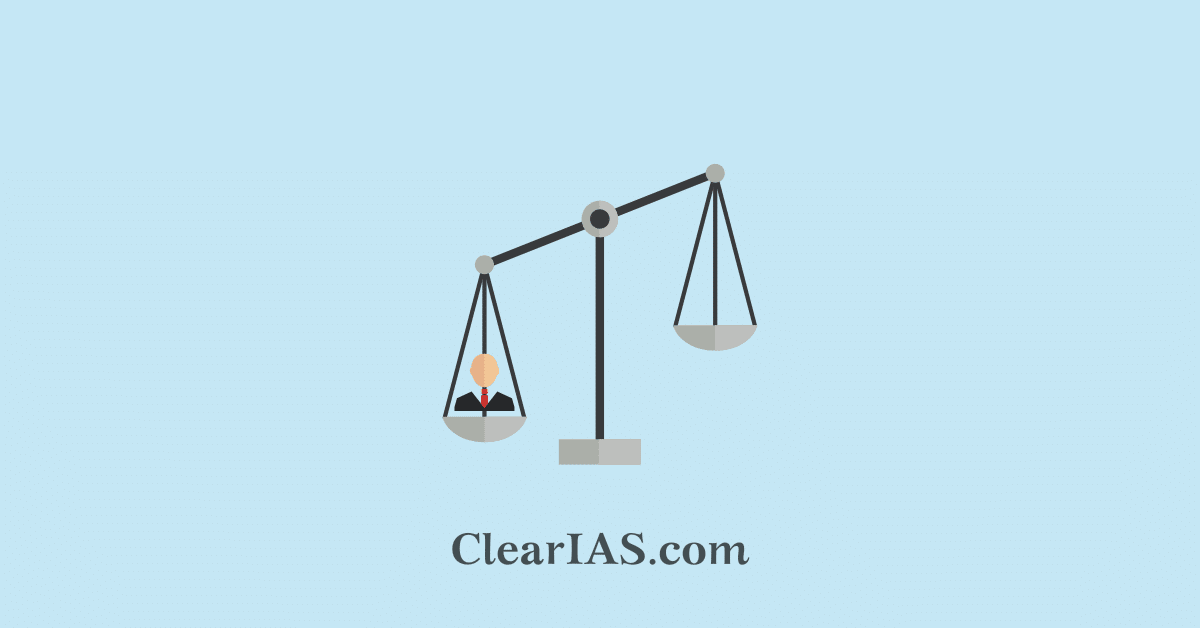
The criminalization of politics is one of the gravest threats to Indian democracy. It refers to the increasing participation of individuals with criminal backgrounds in electoral politics, often protected and promoted by political parties for their winnability. While electoral laws disqualify candidates only upon conviction, the problem persists because trials in criminal cases take years, allowing accused persons to contest elections and even hold ministerial positions.
The Association for Democratic Reforms (ADR) has released a new report that paints a troubling picture of the increasing criminalization of politics in India.
The report analyzed the criminal records of ministers across 27 State Assemblies, 3 Union Territories, and the Union Council of Ministers, revealing how deeply entrenched the nexus between crime and politics has become in the country.
Key Highlights of the Report
- Criminal Cases: Out of 643 ministers examined, nearly 47% have declared criminal cases against themselves.
- Serious Criminal Cases: Around 27% of ministers face serious criminal charges, including allegations of murder, attempt to murder, kidnapping, and crimes against women.
This means almost 1 in 2 ministers has a criminal background, and more than 1 in 4 faces serious charges, a reality that threatens the sanctity of Indian democracy.
Causes of Criminalization of Politics
- Muscle Power and Criminal Nexus
- Politicians often rely on musclemen and local strongmen to mobilize voters, spread fear, or suppress opposition.
- The Dharam Vira Commission (1977) highlighted how political parties reward individuals with criminal backgrounds with tickets because of their “winnability.”
- Money Power
- High election expenditure, often crossing legal limits, creates dependence on black money and illegal funding.
- The politician-bureaucrat-criminal nexus entrenches corruption, where criminals fund elections in exchange for protection or favours.
- Identity Politics
- Elections, especially at the local level, are often fought on caste, religion, or community lines, sidelining candidates’ criminal backgrounds.
- Other Structural Issues
- Weak laws that allow individuals with serious charges to contest elections.
- Slow judicial process means cases drag on for years, allowing accused politicians to continue in power.
- Socio-economic vulnerabilities such as poverty, unemployment, and illiteracy make voters susceptible to manipulation through money or coercion.
Impact of Criminalization of Politics
- Erosion of Democratic Values and Rule of Law: The entry of criminals into legislatures undermines the foundations of democracy, leading to a politics of intimidation and corruption.
- Justice Denied: With politicians influencing law enforcement and administration, accountability and transparency are weakened.
- A Threat to Democracy: There is a risk of India sliding into a “government of criminals, by the criminals, and for the criminals”, where vested interests override public welfare.
- Voter Disillusionment: The intertwining of politics, crime, and violence alienates genuine public participation and erodes people’s faith in the political system.
Measures Taken to Address the Issue
Legislative Safeguards
- Section 8(3), Representation of the People Act (1951): Disqualifies legislators convicted for offences with a minimum sentence of 2 years or more, barring them from contesting for 6 years post-release.
Read: Electoral reforms in India
Key Judicial Developments
Union of India v Association for Democratic Reforms (2002)
- The Supreme Court recognised that voters have a fundamental right to know the criminal, financial, and educational backgrounds of candidates contesting elections.
- It held that this “right to be informed” flows from Article 19(1)(a) (freedom of speech and expression).
- Directed the Election Commission to require all candidates to file affidavits disclosing pending or past criminal charges, convictions, and punishments.
PUCL v Union of India (2004)
- Parliament attempted to nullify the 2002 ruling by enacting Section 33B of the Representation of People (Third Amendment) Act, exempting candidates from filing affidavits on antecedents.
- The Supreme Court struck it down as unconstitutional, affirming that transparency in candidate information is part of free and fair elections, which form the basic structure of the Constitution.
- Prabhakaran v P. Jayarajan (2005)
- The Court explained the purpose of Section 8(3) of the RPA, 1951, which disqualifies convicted individuals sentenced to at least two years.
- Held that the objective is to prevent lawbreakers from becoming lawmakers, thereby ensuring purity in elections.
Lily Thomas v Union of India (2013)
- Struck down the legal provision that allowed convicted MPs/MLAs to retain their seats if they filed an appeal within three months.
- Ruled that a legislator stands disqualified immediately upon conviction where the sentence is at least two years.
Manoj Narula v Union of India (2014)
- A Constitution Bench examined whether persons with criminal backgrounds could be appointed as ministers.
- The Court noted its limited powers, holding that under Article 75(1), the discretion lies with the Prime Minister.
- However, it stressed a constitutional expectation that the PM should avoid appointing individuals with serious criminal charges as ministers.
Law Commission Report (2014 – 244th Report)
- Found that disqualification only upon conviction was ineffective in curbing criminalization.
- Recommended disqualification at the stage of framing of charges for serious offences, with safeguards to prevent misuse.
- Suggested enhancing punishment for filing false affidavits and conducting such trials on a day-to-day basis.
Public Interest Foundation v Union of India (2018)
- A five-judge Bench considered whether candidates should be disqualified at the stage of framing charges.
- The Court declined to introduce new disqualification grounds, leaving the matter to Parliament.
- Directed that political parties must publish the criminal antecedents of their candidates and explain reasons for selection.
Rambabu Singh Thakur v Sunil Arora (2020)
- The Court dealt with a contempt petition against the Election Commission for failing to ensure compliance with the 2018 directives.
- Reiterated that political parties must widely publicise the criminal records of their candidates.
- Ordered the ECI to monitor compliance and report violations to the Supreme Court.
Way Forward
- Stricter Disqualification Rules: Bar candidates facing serious charges (like murder, rape, corruption) from contesting elections until acquitted.
- Fast-Track Courts: Establish special courts to ensure speedy trial of cases involving elected representatives.
- Electoral Reforms: Implement state funding of elections, cap expenditures, and enhance scrutiny of election financing to curb money power.
- Voter Awareness: Strengthen civil society initiatives and media efforts to empower citizens to make informed choices.
- Party Accountability: Political parties must be held responsible for fielding candidates with criminal records — through stricter penalties and public disclosure norms.
Conclusion
The ADR report is a stark reminder of the deep-rooted criminalization of politics in India.
While judicial interventions have helped introduce some checks, loopholes in the system, a lack of political will, and voter manipulation continue to allow criminals to dominate legislatures.
Unless structural reforms are urgently undertaken, India’s democracy faces the risk of being undermined by those it elects to protect it.






Leave a Reply